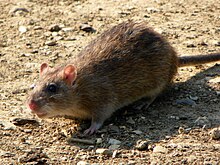Brown rat
| Brown rat Temporal range: Early Holocene - Recent
| |
|---|---|

| |
| A wild rat in England | |
| Scientific classification | |
| Domain: | Eukaryota |
| Kingdom: | Animalia |
| Phylum: | Chordata |
| Class: | Mammalia |
| Order: | Rodentia |
| Family: | Muridae |
| Genus: | Rattus |
| Species: | R. norvegicus
|
| Binomial name | |
| Rattus norvegicus (Berkenhout, 1769)
| |
The brown rat is Rattus norvegicus. It is also known as the common rat, sewer rat, wharf rat, Norwegian rat and Parisian rat. It is a large brown or grey rodent with a head and body length of up to 28 cm (11 in) long, and a tail slightly shorter than that. It weighs between 140 and 500 gms (5 and 17+3⁄4 oz). This rodent has spread to all continents except Antarctica, and is the dominant rat in Europe and much of North America. With rare exceptions, the brown rat lives wherever humans live, especially in urban areas.
The rat has been wrongly associated with the bubonic plague. However, the plague bacterium, Yersinia pestis, is endemic in only a few rodent species and is usually transmitted by rat fleas. Carrier rodents today include ground squirrels and wood rats.[2]
References
[change | change source]- ↑ Ruedas, L.A. (2016). "Rattus norvegicus". IUCN Red List of Threatened Species. 2016: e.T19353A165118026. doi:10.2305/IUCN.UK.2016-3.RLTS.T19353A165118026.en. Retrieved 19 November 2021.
- ↑ Caten J.L. 1968. Human plague in the United States 1900–1966. JAMA: The Journal of the American Medical Association. 205 (6): 333.

